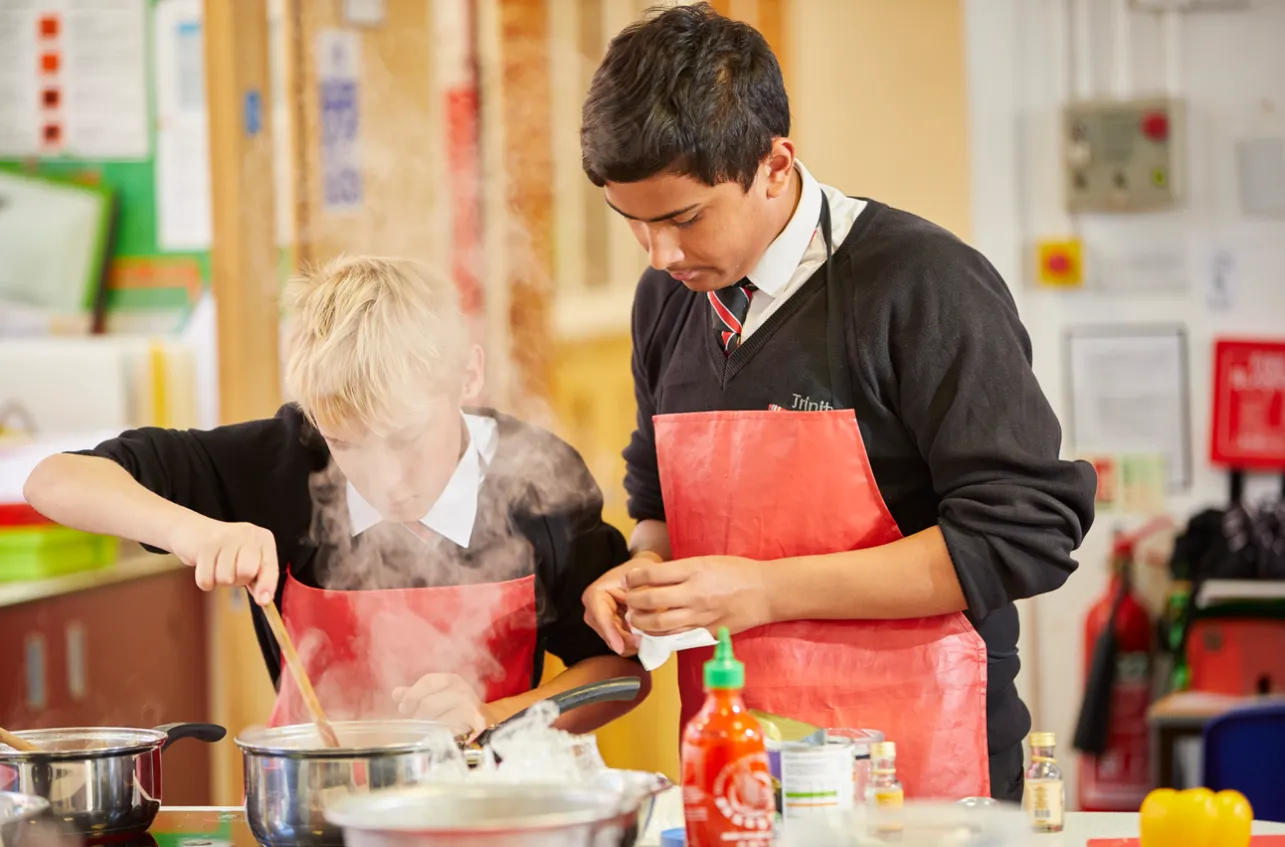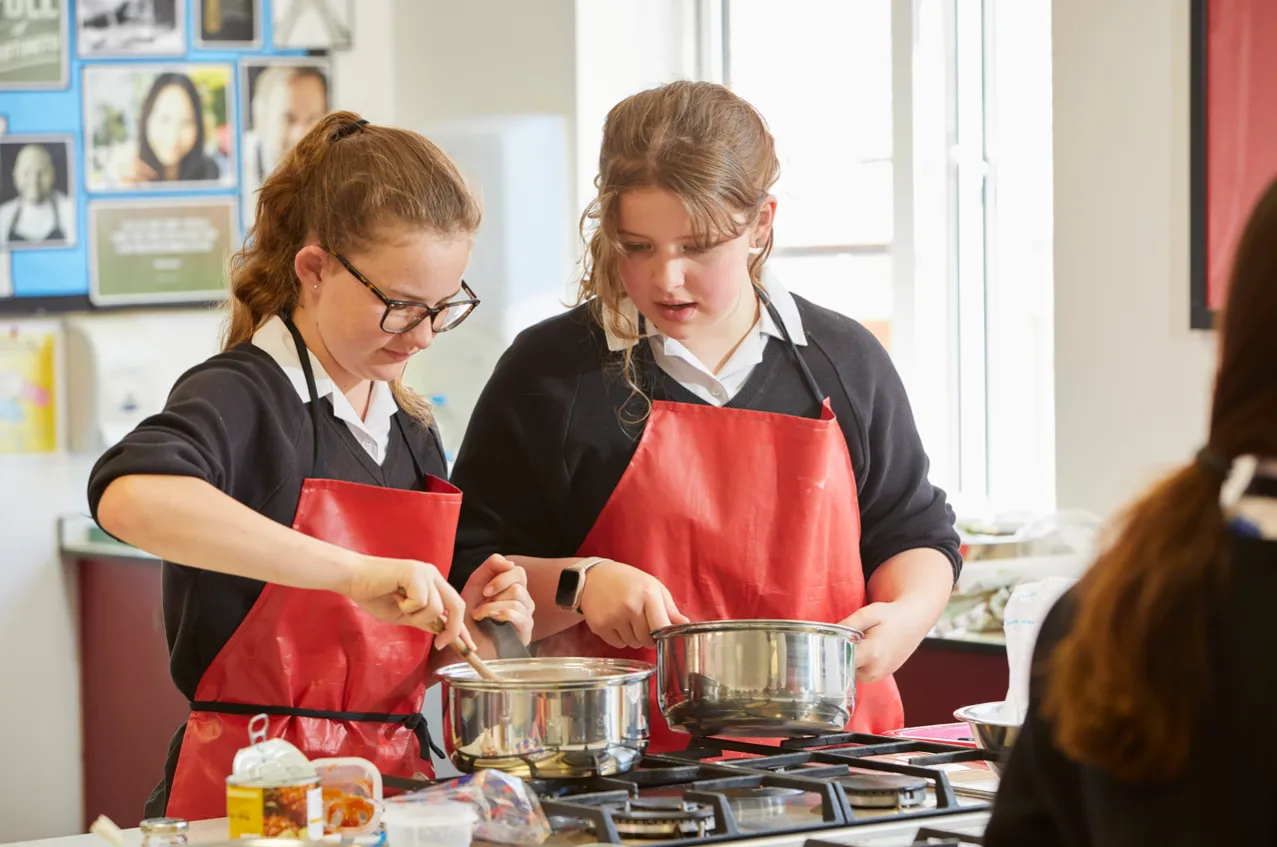01635 510500
Within KS3 D&T students complete a rotation working with food as a material. Within this unit they learn about core concepts of healthy eating and follow the Eatwell guide as a means from which to prepare a range of balanced meals. Hospitality and Catering progresses this knowledge to develop students’ in depth understanding of the functions of nutrients and malnutrition. Throughout KS4 students draw on their core health and safety knowledge learnt in KS3 and develop this by learning more about food hygiene and safety regulations and laws within industry. Through making a variety of sweet and savoury dishes students in KS3 learn core practical skills which are then revised and developed throughout KS4. In year 9 the focus is for students to progress their practical skills and understand the expectations for GCSE level practical work. They are introduced to more complex knife skills and learn the theory around different knives and cuts. They learn different cake making methods and how to execute these methods both by hand and by machine. As such they learn how to use a wider range of electronic equipment. They also focus on preparing and cooking basic commodities such as meat, fish, eggs and staple foods such as rice and pasta.
Year 7
|
Introduction to food safety & hygiene, nutrition and cooking skills |
|
Students will…
|
Year 8
|
Seasonality, adapting recipes and dietary needs |
|
Students will…
|
Assessment:
Throughout Year 7 and Year 8, students’ knowledge and skills are assessed through opportunities to demonstrate their food and cooking capability through both written knowledge questions on food in addition to their practical cooking skills and dishes they produce.


At Key Stage 4 we also offer WJEC Level 1/2 Award in Hospitality and Catering. Students studying this course will learn about the following core topics:
Students will also learn about: ingredients, the characteristics of food, foods for differing occasions, commercial costing, developing their own dishes and menus, food hygiene and safety at work, nutrition and menu planning, kitchen design, food presentation and the use of larger industrial equipment.
Year 9
|
Personal hygiene and safety |
Professionalism in catering/cooking |
Health |
First aid |
Cross contamination and key temperatures |
Practical cooking skills development |
Year 10
|
Balanced and healthy diets |
Menu planning |
Theory of commodities |
Cooking methods – sweet and savory dishes |
Macro and micro nutrients |
Job roles in industry |
Year 11
|
Controlled assessment: menu planning |
Controlled assessment: practical exam (cooking of dishes) |
Exam revision and preparation |
Assessment:
Throughout Years 9, 10 and 11, students’ knowledge and skills are assessed through opportunities to demonstrate their food and cooking capability through a series of practical tasks where students produce dishes, as well as more focused practical tasks where students demonstrate more specific skills – e.g. knife cuts.
The final grade for Hospitality and Catering consists of 60% controlled assessment, which involves the planning and production of dishes to demonstrate cooking and food preparation capability – this includes both written and practical elements. The other 40% of the final grade will come from a written exam which assesses students’ knowledge of areas of Hospitality and Catering learnt over the course.
Year 12
|
Meeting nutritional needs of specific groups |
Micro organisms |
Properties, structure and classification of nutrients |
Planning and production of complex dishes |
Year 13
|
Current issues in food science and nutrition |
Ensuring food is safe to eat |
External assessment – written piece based on food scenario |
Assessment:
Throughout Years 12 and 13, students’ knowledge and skills are assessed through opportunities to demonstrate their food capability through a range of practical tasks and experiments with food, including cooking dishes and experimentation with ingredients and recipes. Students will also be assessed through a written paper in Year 12, which will account of 25% of the final grade, as well as a written task and practical experimentation task.
Extra-curricular opportunities
We offer a wide range of extra-curricular activities and experiences to enhance students’ learning across all year groups and provide opportunities for students to showcase their talent and flair with food and cooking, including:
Facilities
Our accommodation consists of a range of modern facilities, which includes a state of the art catering kitchen, with a wide range of equipment to develop more complex cookery skills.